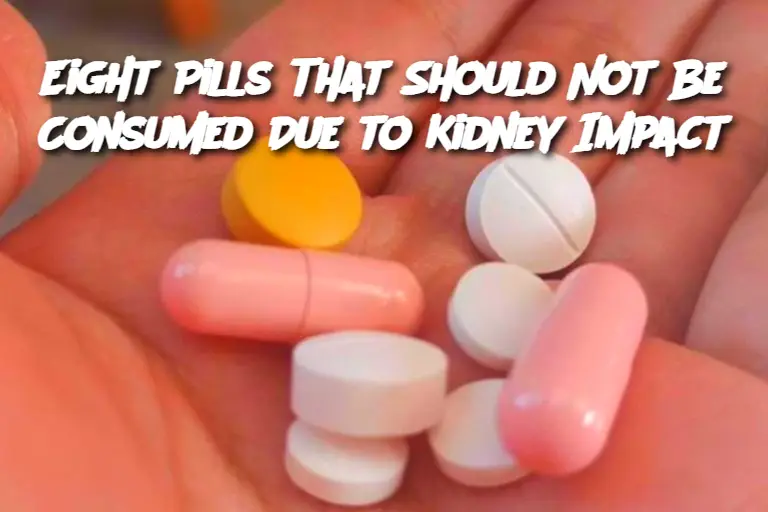ADVERTISEMENT
Introduction:
The kidneys are vital organs responsible for filtering waste products and excess fluids from the blood, which are then expelled as urine. These organs also help regulate vital functions, such as maintaining electrolyte balance and blood pressure. However, certain medications and substances can affect kidney function, causing short-term or even long-term damage. In this article, we will discuss eight common pills that should be avoided or taken with caution due to their potential harmful effects on the kidneys.
1. Nonsteroidal Anti-inflammatory Drugs (NSAIDs)
Examples: Ibuprofen, Naproxen, Aspirin
NSAIDs are commonly used to reduce pain, inflammation, and fever. However, prolonged or excessive use of these medications can harm the kidneys. They can interfere with the kidney’s ability to filter blood, leading to fluid retention, high blood pressure, and kidney damage, especially in individuals who already have underlying kidney conditions.
2. Angiotensin-Converting Enzyme (ACE) Inhibitors
Examples: Enalapril, Lisinopril, Ramipril
ACE inhibitors are used to treat high blood pressure and heart conditions. While they can be beneficial for controlling blood pressure, they can cause kidney problems in some individuals, particularly in those who are dehydrated or have pre-existing kidney disease. These medications may raise potassium levels and increase the risk of kidney failure in some cases.
3. Diuretics (Water Pills)
Examples: Furosemide, Hydrochlorothiazide
Diuretics are often prescribed to treat conditions like high blood pressure, heart failure, and edema (fluid retention). They work by helping the kidneys eliminate excess salt and water from the body. However, overuse or misuse of diuretics can lead to dehydration, low potassium levels, and kidney dysfunction.
4. Antibiotics (Certain Types)
Examples: Gentamicin, Vancomycin, Ciprofloxacin
While antibiotics are essential for treating bacterial infections, certain antibiotics can be nephrotoxic (harmful to the kidneys). For example, aminoglycosides (like Gentamicin) and some others can cause kidney damage, particularly if used for long periods or in high doses. It’s crucial to use these drugs only under medical supervision.
5. Proton Pump Inhibitors (PPIs)
Examples: Omeprazole, Pantoprazole, Esomeprazole
PPIs are commonly used to treat acid reflux and stomach ulcers by reducing stomach acid production. Long-term use of these medications has been linked to an increased risk of kidney disease, especially in patients with pre-existing kidney conditions. Over time, they can contribute to kidney damage and lead to a condition called acute interstitial nephritis.
6. Lithium
Examples: Lithobid, Eskalith
Lithium is commonly prescribed to treat bipolar disorder. However, it can have a significant impact on kidney function, especially when used for extended periods. Chronic lithium use can lead to nephropathy, which is characterized by kidney damage and dysfunction. Regular monitoring of kidney function is essential for individuals taking lithium.
7. Pain Medications Containing Acetaminophen
Examples: Tylenol, Excedrin, Anacin
Acetaminophen is a commonly used pain reliever and fever reducer. While it is generally considered safe when taken as directed, high doses or chronic use can be harmful to the kidneys, especially if combined with alcohol or other drugs that put strain on the liver and kidneys. Acetaminophen overdose is one of the leading causes of acute kidney injury.
8. Antifungal Medications
Examples: Amphotericin B, Fluconazole
Antifungal medications like Amphotericin B are potent drugs used to treat serious fungal infections. While effective, they are also known to be nephrotoxic, particularly when given in high doses or over long periods. Kidney function should be closely monitored when using these drugs.
Preparation:
If you are currently taking any of these medications, it’s important to follow your healthcare provider’s instructions closely and discuss any concerns about kidney health. In some cases, your doctor may recommend an alternative medication that is less likely to cause harm to your kidneys.
Serving and Storage Tips:
For patients taking medications that impact kidney function, it is essential to stay hydrated, monitor blood pressure regularly, and undergo routine kidney function tests as advised by a healthcare professional. Always store medications in a cool, dry place and never exceed the recommended dose.
Variant:
ADVERTISEMENT
